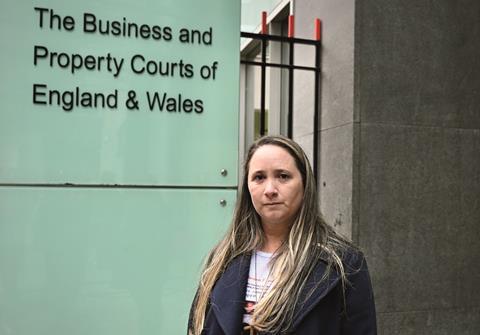Monica Dos Santos lost everything in Brazil’s Fundão dam collapse – then trained as a lawyer to fight for justice

It was a normal day when Monica Dos Santos left her home in November 2015 and headed to work. By the time she was able to return, the following day, everything was gone.
The Fundão dam collapse in Minas Gerais, Brazil, unleashed millions of cubic metres of toxic waste, killing 19 people and destroying entire communities. Dos Santos’ home and all her belongings were swept away in the mud, sludge and waste. Even the clothes on her back were eventually taken from her.
With nothing left, Dos Santos, 39, took up the opportunity to help others in their legal fight to seek justice for the collapse. In time, it led to her leaving her 18-year administrative career to join the legal profession and a determination to fight ‘for responsibility’ over the dam collapse.
Now a lawyer in Brazil, Dos Santos spoke to the Gazette about her experiences since. She said: ‘That day I left my home and I simply never returned. I was left with nothing.’ After a call from her cousin, Dos Santos tried to contact friends and family in the area ‘without success’. Returning to her home town, Bento, was not possible as roads were closed. Dos Santos said she thought a different dam, a water dam, had ruptured.
She said: ‘I thought maybe the water had passed and we wouldn’t be able to save our things but I would still get home. My home would be flooded but everything would be okay and we would clean up.’
'For me, compensation is not just about money. Money will not bring back everything we have lost. I lost my father when I was seven; for me to remember what he looked like I would reach for a photo, now I don’t have those photos'
Monica Dos Santos
Dos Santos spent the night on the road. With the morning light, she made it to higher ground and only then realised what had happened. ‘In that moment I saw that I didn’t have my house anymore. My house didn’t exist. All I could see was mud, a car, a bus, a roof. In that moment I realised I had nothing.
‘I had the clothes on my back but when we arrived at a building that had been converted into an emergency help centre, I didn’t even get to keep my clothes. We had to take them off and have them disinfected. So, even the clothes I had on I could not keep.’
Her legal career was ‘not my choice but chosen for me’, she said, when two friends asked her to help in their fight for justice.
She said: ‘I learned a lot on my course but the right to justice is not the same as what is written in law.’ In Brazilian courts ‘the theoretical is very different to the practical. It frustrated me how different it is. The theory was not applied in real life, or if it was, not in the way it should. If the law applied in the way it should, [the people responsible for the disaster] would have been punished and not just in paying compensation.
‘For me, compensation is not just about money. Money will not bring back everything we have lost. I lost my father when I was seven; for me to remember what he looked like I would reach for a photo, now I don’t have those photos. There are no photos of him left.’
Asked about the claim in the English courts against mining giant BHP – the company denies all liability – Dos Santos said: ‘It has been almost 10 years [since the collapse]. We have left Brazil, without speaking the language, and we have come [to England] to seek justice. It is about responsibility. We know that someone is responsible.
‘There will be a judgment, but we know that it is not the end. [The collapse] is something we will carry for the rest of our lives.
‘Bento, my community, is from the 18th century, it is more than 300 years old. [Mining company] Samarco Mineração is 40-odd-years old. The risk came to us, to our community. The collapse turned our lives upside down. The Monica from 2015 is not the same Monica of today.
‘Until I see someone punished for this, I will not rest. Even if I must fight for the rest of my life for that. I want responsibility. From responsibility, punishment will happen. It will not bring anyone back, it will not bring my life back but it will show the world that justice was done.’
Interview conducted in Portuguese and translated into English




































No comments yet